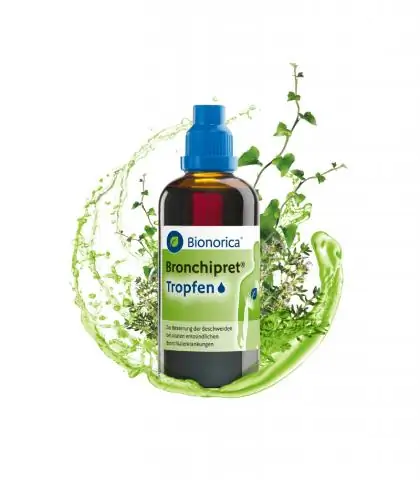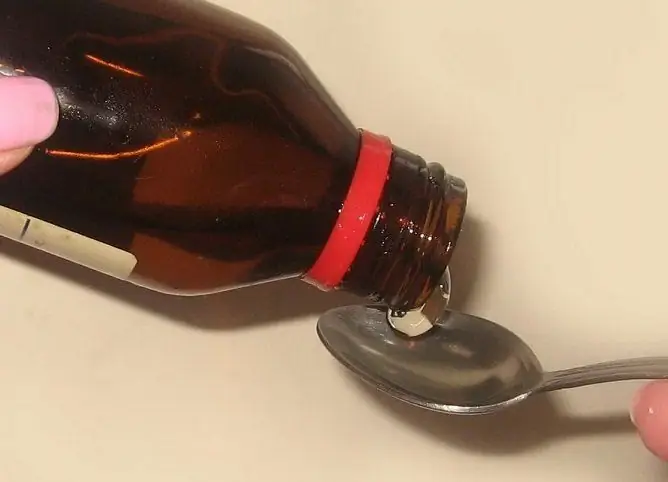- Author Rachel Wainwright wainwright@abchealthonline.com.
- Public 2023-12-15 07:39.
- Last modified 2025-11-02 20:14.
Siresp
Sirep: instructions for use and reviews
- 1. Release form and composition
- 2. Pharmacological properties
- 3. Indications for use
- 4. Contraindications
- 5. Method of application and dosage
- 6. Side effects
- 7. Overdose
- 8. Special instructions
- 9. Application during pregnancy and lactation
- 10. Use in childhood
- 11. Drug interactions
- 12. Analogs
- 13. Terms and conditions of storage
- 14. Terms of dispensing from pharmacies
- 15. Reviews
- 16. Price in pharmacies
Latin name: Syresp
ATX code: R03DX03
Active ingredient: fenspiride (fenspiride)
Producer: Medana Pharma, SA (Poland)
Description and photo updated: 22.11.2018

Sirep is an anti-inflammatory anti-bronchoconstrictor drug.
Release form and composition
Dosage form of Sirep - syrup: clear orange liquid, opalescence is allowed (150 ml each in a dark plastic bottle with a plastic screw cap equipped with a “first opening” ring, in a cardboard box 1 bottle complete with a dosing spoon).
Composition of 1 ml of syrup:
- active substance: fenspiride hydrochloride - 2 mg;
- auxiliary components: methyl parahydroxybenzoate, propyl parahydroxybenzoate, potassium sorbate, glycerol, sodium saccharinate, sucrose, vanilla and honey flavors, sunset yellow dye, citric acid monohydrate, purified water.
Pharmacological properties
Pharmacodynamics
The anti-inflammatory and anti-bronchoconstrictor effect of the drug is explained by the ability of its active substance, fenspiride, to reduce the production of biologically active substances that play an important role in the development of inflammation and bronchospasm, such as cytokines, especially tumor necrosis factor α (TNF-α), free radicals, derivatives of arachidonic acid. H 1 -antihistaminny action of fenspiride potentiates its inhibition of the metabolism of arachidonic acid, since histamine stimulates the metabolism of arachidonic acid with the formation of leukotrienes and prostaglandins.
Also fenspiride blocks α-adrenergic receptors, thereby reducing the secretion of bronchial glands, and has an antispasmodic effect.
Pharmacokinetics
When the drug is taken orally, it is well absorbed from the gastrointestinal tract (GIT). The time to reach the maximum plasma concentration is 2.3 ± 2.5 hours (from 30 minutes to 8 hours). The half-life is 12 hours; 90% of the dose taken orally is excreted by the kidneys, 10% through the intestines.
Indications for use
According to the instructions, Sirep is indicated as a remedy for the symptomatic treatment of the following diseases and conditions:
- laryngitis and rhinopharyngitis;
- tracheobronchitis;
- bronchitis (with or without chronic respiratory failure);
- bronchial asthma (in combination with other drugs);
- respiratory symptoms in whooping cough, measles and flu, such as cough, sore throat, hoarseness;
- respiratory tract infections with cough (in cases where standard antibiotic therapy is indicated);
- sinusitis and otitis media (including allergic ones).
Contraindications
- fructose intolerance, sucrase-isomaltase deficiency, glucose-galactose malabsorption;
- pregnancy and lactation;
- age up to 2 years;
- increased sensitivity to the components of the drug.
Patients with diabetes should take Sirep with caution, since the drug contains sucrose.
Instructions for the use of Sirep: method and dosage
Syresp syrup is taken orally, before meals.
Recommended dosage:
- children over 2 years old with a body weight of ˂ 10 kg: 10-20 ml, or 2-4 scoops per day (can be added to a bottle with food);
- children over 2 years old with a body weight of ˃ 10 kg: 30-60 ml, or 6-12 dispensing spoons per day;
- adults: 45-90 ml, or 9-18 scoops per day.
The duration of therapy is determined by the attending physician.
Side effects
- cardiovascular system: moderate tachycardia (its severity decreases as the dose of the drug decreases);
- digestive system: gastrointestinal disorders, epigastric pain, nausea, vomiting, diarrhea;
- central nervous system: drowsiness, dizziness;
- skin and subcutaneous tissues: erythema, rash, urticaria, angioedema, fixed erythema pigmentosa, pruritus;
- other: increased fatigue, asthenia.
Overdose
Symptoms of a Sirep overdose: agitation or drowsiness, nausea, vomiting, sinus tachycardia.
Recommended treatment: gastric lavage, symptomatic therapy aimed at maintaining vital body functions. An electrocardiogram should be done.
special instructions
Due to the presence of parabens (methyl parahydroxybenzoate and propyl parahydroxybenzoate) and dye in Sirespa, there is a risk of developing allergic reactions, including delayed ones. The presence of glycerol in the composition can lead to headaches, indigestion and diarrhea.
Patients with diabetes mellitus should take into account that 1 syrup dispenser spoon (5 ml) contains 3 g of sucrose = 0.25 XE.
Influence on the ability to drive vehicles and complex mechanisms
Due to the risk of side effects such as drowsiness, care should be taken when driving vehicles and other complex mechanisms that require the speed of psychomotor reactions.
Application during pregnancy and lactation
Syrup syrup is contraindicated for use during pregnancy and lactation due to the lack of data on its fetotoxic effect, the ability to cause malformations and penetrate into breast milk. Taking Sirep is not a reason to terminate the onset of pregnancy.
Pediatric use
The use of the drug is allowed for children over 2 years old.
Drug interactions
It is not recommended to take Sirep with blockers of histamine H 1 receptors, sedatives, and alcohol.
Analogs
Analogs of Sirep are: Fenspirid, Fespalen, Eladon, Epistat, Erespal, Erispirus.
Terms and conditions of storage
Store away from light, at a temperature not exceeding 25 ° C. Keep out of the reach of children.
Shelf life - 3 years, opened bottle is stored for 6 months.
Terms of dispensing from pharmacies
Dispensed by prescription.
Reviews about Sirep
Reviews about Sirep on the network are mostly positive. Most patients note its effectiveness in fighting cough, mild sputum thinning and a relatively low cost. However, some did not see the effect of the drug, also among the minuses they noted the specific taste and too bright color of the syrup, the presence of additives and flavors in the composition, the impossibility of using the drug in children under 2 years old and the limited shelf life after opening the bottle.
Price for Sirep in pharmacies
Estimated price for Sirep, 2 mg / ml syrup, 150 ml bottle - 170 rubles.

Anna Kozlova Medical journalist About the author
Education: Rostov State Medical University, specialty "General Medicine".
Information about the drug is generalized, provided for informational purposes only and does not replace the official instructions. Self-medication is hazardous to health!






